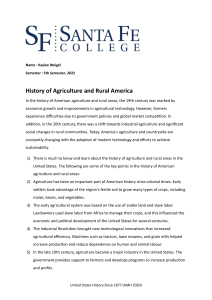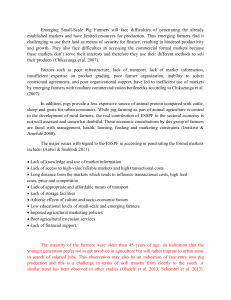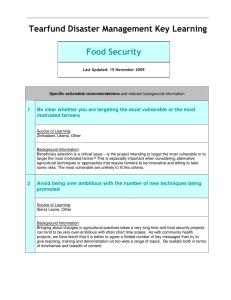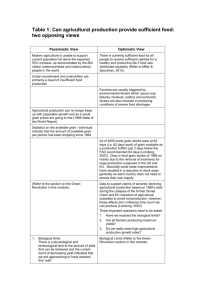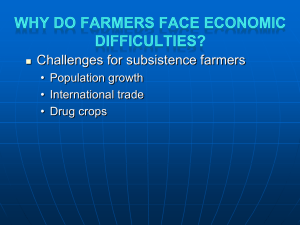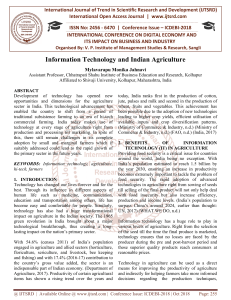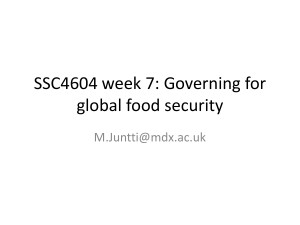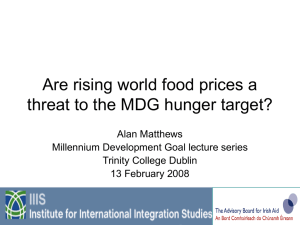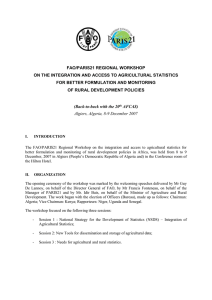Mobilizing the Potential of Rural and Agricultural Extension
advertisement
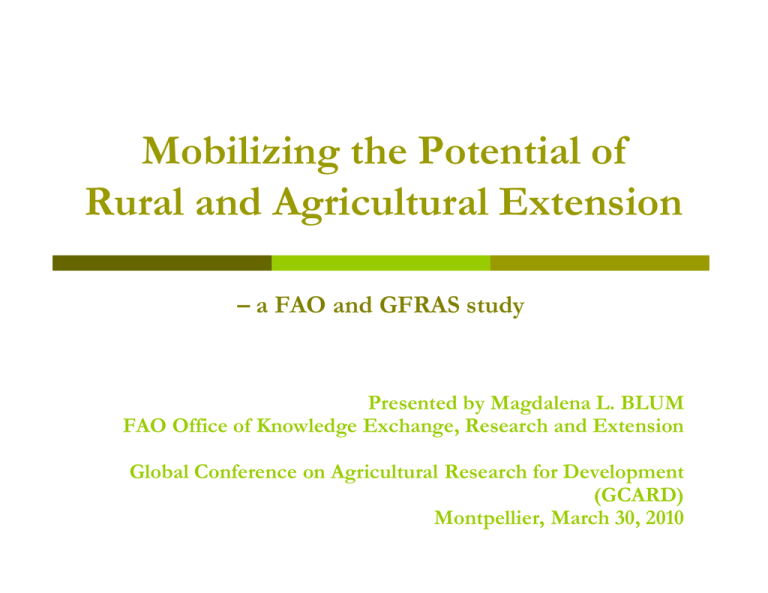
Mobilizing the Potential of Rural and Agricultural Extension – a FAO and GFRAS study Presented by Magdalena L. BLUM FAO Office of Knowledge Exchange, Research and Extension Global Conference on Agricultural Research for Development (GCARD) Montpellier, March 30, 2010 FAO and GFRAS: Towards a new vision for extension Consensus achieved by FAO, the Neuchâtel Initiative and the Global Forum for Rural Advisory Services (GFRAS) and its affiliates Intention ∼ to outline challenges and a new vision on extension Views ∼ on Demand-drive, market orientation and poverty focus Links with research currently very weak: Can GCARD start to rebuild these relations? What is extension? Not what you might expect Information and advisory services needed and demanded by farmers and other actors in agrifood systems and rural development, such as… Dissemination of information about technologies, new research, markets, input and financial services, and climate Development of business skills and market linkages Linkages between farmer organizations and market actors Support to institutional and organizational development Facilitating access and collaboration with non-extension programmes Mediating in conflicts over natural resources, land tenure, … Core challenges to extension – Institutional change and strengthening Normative reforms without grand models Change ∼ from project support to systematic, institutional development Country-specific institutional and organizational solutions Processes involving all stakeholders concerned New institutional arrangements needed flexible continuous changes increased complexity ⇒ ⇒ ⇒ lean/flat learn & adapt collaboration, multi-disciplinarity Core challenges to extension – Tailored advice, not a method or technology ‘fix’ False assumption that extension can be ‘fixed’ with the ‘right’ formula Diversity of clients and situations require tailored advice and a menu of options Innovative methods and communication tools have emerged Challenges remain in anchoring these innovations in existing institutional structures addressing the financial and human resource constraints in scaling up their use Core challenges to extension – Increasing equity and accountability Extension has a bad reputation regarding equitable and inclusive rural development Breaking with gender and wealth biases Pluralism and subsidiarity required to best serve different client groups Extension is central to addressing equity and accountability challenges through stakeholders involvement and empowerment Willingness of farmers and their organizations to cost sharing Enabling farmers to pay for their services Core challenges to extension – Addressing human resource constraints Human resource capacities are a major constraint New skills (facilitation, coordination, coaching, mediation, ...) are needed Enabling to deal with complexity which demands critical, systemic thinking and problem solving Educational levels are also dropping and agricultural education institutions are in a serious state of decline This HR crisis demands sustainable long-term investment strategies Core challenges to extension – Investments and new financing mechanisms Not a question of simply increasing investments, but of where and how investments are done Public commitment needed to reach the poor, even where services are carried out by non-state actors Need for sustainable financing mechanisms with a supply and demand side balance small producers and their organizations are enabled to pay for the services they receive accountability a competitive market for service provision is created performance criteria for support to service providers learning from the private sector and how they contract extension services to ensure quality agricultural products Can a new relationship between research and extension address these challenges? The one way technology transfer role of extension is no longer viable Dynamic and flexibility required in today’s innovation systems Extension cannot make research developed for better off farmers accessible to the poor farmers Multiple innovations are needed (technological, financial, methodological, institutional, organizational, ...) More attention to farmers’ own innovations Uncertainty (climate, markets, technological change) requires dealing with risks ∼ research and extension Extension agencies must transcend their image / roles ‘Expert’ providers of knowledge from research ⇒ facilitation and advisory roles increasingly important Can a new relationship between research and extension address these challenges? New research – extension agenda New respectful relationship and institutionalized collaboration learning from extension strengthening of extension and research institutions, and FOs Pluralistic extension ‘systems’ are highly unsystematic and extension providers act locally ⇔ few research institutes increasingly producer-owned extension networks A common approach ∼ producers needs and demands more than linking research and extension supply side pressure likely to be counter productive Farmer representation and influence where decisions about research and extension priorities are being made . Thank you for your attention
